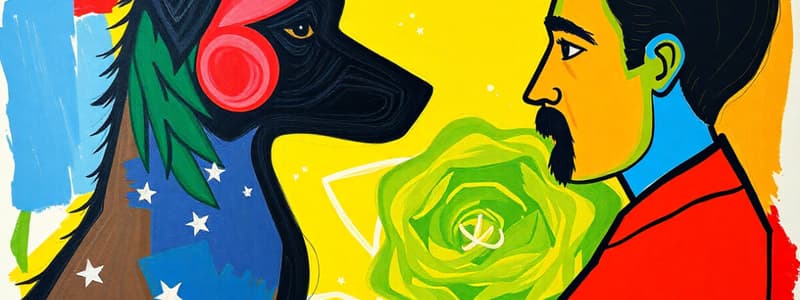Podcast
Questions and Answers
What does classical conditioning primarily involve?
What does classical conditioning primarily involve?
- Observational learning from others
- Creating associations between stimuli (correct)
- Memorization of facts
- Learning through reinforcement and punishment
What is the term for the disappearance of a conditioned response when the conditioned stimulus is presented without the unconditioned stimulus?
What is the term for the disappearance of a conditioned response when the conditioned stimulus is presented without the unconditioned stimulus?
- Extinction (correct)
- Stimulus generalization
- Conditioning
- Spontaneous recovery
Which of the following describes spontaneous recovery in classical conditioning?
Which of the following describes spontaneous recovery in classical conditioning?
- The sudden end of a conditioned response
- Learning to distinguish between different stimuli
- The return of a conditioned response after a rest period (correct)
- Generalizing responses to different stimuli
What does stimulus generalization entail?
What does stimulus generalization entail?
What happens during stimulus discrimination?
What happens during stimulus discrimination?
What role does the unconditioned stimulus (UCS) play in Pavlov's classical conditioning?
What role does the unconditioned stimulus (UCS) play in Pavlov's classical conditioning?
In Pavlov's experiment, what is the conditioned stimulus (CS)?
In Pavlov's experiment, what is the conditioned stimulus (CS)?
Which method did Pavlov primarily use to conduct his research?
Which method did Pavlov primarily use to conduct his research?
Flashcards
Classical Conditioning
Classical Conditioning
Learning through associating a neutral stimulus with a stimulus that naturally triggers a response.
Unconditioned Stimulus (UCS)
Unconditioned Stimulus (UCS)
A stimulus that naturally and automatically triggers a response.
Unconditioned Response (UCR)
Unconditioned Response (UCR)
The automatic response triggered by the unconditioned stimulus.
Conditioned Stimulus (CS)
Conditioned Stimulus (CS)
Signup and view all the flashcards
Conditioned Response (CR)
Conditioned Response (CR)
Signup and view all the flashcards
Stimulus Generalization
Stimulus Generalization
Signup and view all the flashcards
Stimulus Discrimination
Stimulus Discrimination
Signup and view all the flashcards
Extinction (in classical conditioning)
Extinction (in classical conditioning)
Signup and view all the flashcards
Study Notes
Learning Principles
- Learning is defined as measurable behavioral changes resulting from practice and accompanying conditions.
Basic Theories of Learning
- Classical Conditioning (Ivan Pavlov): Focuses on involuntary responses.
- Operant Conditioning (B.F. Skinner): Deals with voluntary behaviors and consequences.
- Social Learning (Bandura): Emphasizes observational learning and modeling.
Ivan Pavlov (1849-1936)
- Conducted research on digestion at the Institute of Experimental Medicine (1891-1900).
- His research on digestion led to advances in theoretical and practical medicine.
- Pavlov demonstrated the nervous system's role in digestion. This is fundamental to modern physiology.
- In his studies, he paid close attention to 'psychic secretion', a response to food stimuli from a distance.
Pavlov's Dog Experiment
- A key experiment in classical conditioning.
- Demonstrates how a neutral stimulus (e.g., a bell) can become associated with a naturally occurring stimulus (e.g., food) to trigger a learned response (e.g., salivation).
Pavlov's Experiment Components
- UCS (Unconditioned Stimulus): Naturally triggers a response (e.g., food).
- UCR (Unconditioned Response): Natural response to the UCS (e.g., salivation).
- NS (Neutral Stimulus): Initially does not trigger the response (e.g., bell).
- CS (Conditioned Stimulus): After pairing with the UCS, the NS becomes the CS and triggers the response (e.g., bell).
- CR (Conditioned Response): Learned response to the CS (e.g., salivation).
Signal Learning
- The conditioned stimulus (CS) is presented before the unconditioned stimulus (UCS).
- The learner learns to associate the CS with the UCS which leads to a response from a particular stimulus.
- Learning involuntary responses is a key component of this type of learning.
Extinction
- The disappearance of the conditioned response.
- Occurs when the conditioned stimulus (CS) is repeatedly presented without the unconditioned stimulus (UCS).
Spontaneous Recovery
- The reappearance of a conditioned response in the presence of the conditioned stimulus (CS) after a period of rest.
Stimulus Generalization
- Responding to stimuli that are similar to the conditioned stimulus (CS) in the same way as the CS.
- For instance, a person might react to the smell of pizza from any pizza shop similarly.
Stimulus Discrimination
- Responding differently to stimuli that are similar to the conditioned stimulus (CS).
- For instance, responding only to the smell of a specific pizza shop.
Homework Assignment
- Provide examples from own life for each concept.
- Explain each concept using a single, personal example.
Studying That Suits You
Use AI to generate personalized quizzes and flashcards to suit your learning preferences.




